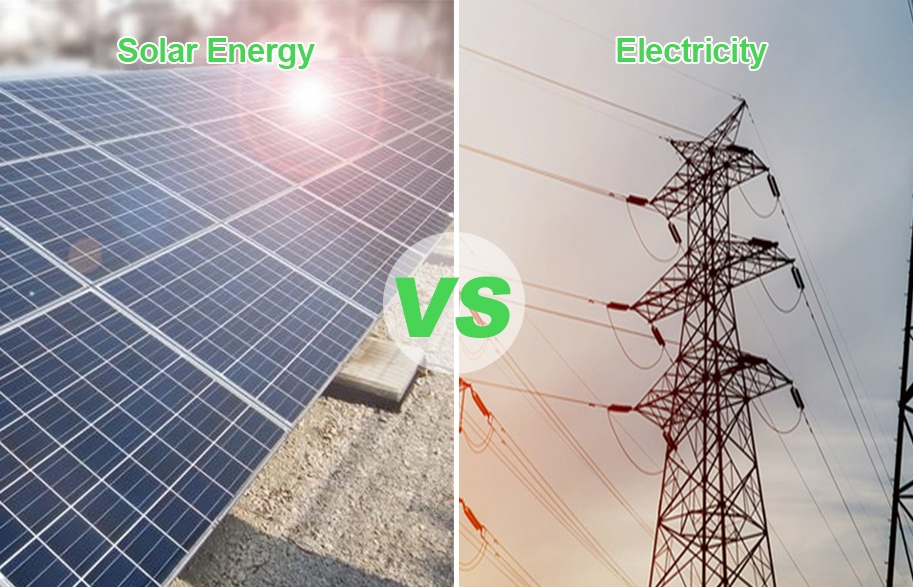Solar energy, derived from the light and heat of the sun, is increasingly becoming a vital part of human energy consumption. It can be converted not only into electricity but also into thermal energy, continuously powering our lives. Electrical energy, the foundation of modern society, is essential in every aspect—from household appliances to industrial production. In this blog, Inverter.com will delve into the differences between solar energy and electrical power, their unique characteristics, and their roles in modern society.
Source of Energy: The Clash of Natural and Artificial Power
Electrical Power: Electricity comes from various sources, with fossil fuels—such as coal, oil, and natural gas—being the most common. These fuels release energy when burned, driving turbines to generate electricity. Coal power is one of the oldest methods, offering relatively low costs but with severe environmental issues, particularly the increase of carbon dioxide emissions, which contribute to global warming. While oil and natural gas are cleaner alternatives, they also face the threat of depletion. Additionally, hydroelectric power, wind power, and nuclear power play significant roles in the energy mix, each with its pros and cons, forming the modern power supply system.
Solar Energy: Solar energy is a completely renewable and pollution-free energy source. It directly converts sunlight into electricity using photovoltaic (PV) panels. These panels consist of numerous solar cells that produce electricity when exposed to light. Since solar power generation does not require fuel combustion, it produces no greenhouse gas emissions, making it environmentally friendly. Moreover, solar resources are almost universally available—wherever there is sunlight, a solar power system can be installed, providing electricity even in remote areas.

Environmental Impact: Green vs. Gray Energy
Electrical Power: Traditional electricity generation, particularly from fossil fuels, has significant negative impacts on the environment. Burning fossil fuels releases large amounts of carbon dioxide, sulfur compounds, nitrogen oxides, and particulates, severely polluting the air. Additionally, the extraction and transportation of fossil fuels contribute to environmental degradation. While hydropower and nuclear power are relatively cleaner, they also bring ecological disruption and challenges, such as the management of nuclear waste.
Solar Energy: Solar energy generation, on the other hand, is a completely environmentally friendly way of utilizing energy. It requires no fuel combustion and emits no harmful substances. At the same time, the installation and operation of solar power systems (whether connected to grid-tied inverters or off-grid inverters) cause minimal environmental disruption and do not harm the ecosystem. Solar energy also reduces reliance on traditional energy sources, lowering risks to energy security.
Renewability: Infinite vs. Finite Resources
Electrical Power: The natural resources that traditional electricity production relies on—such as fossil fuels, oil, and natural gas—are finite. As human society continues to develop, the consumption of these resources increases annually, raising the risk of resource depletion. Additionally, the extraction and transportation of fossil fuels contribute to environmental damage, further exacerbating resource scarcity.
Solar Energy: Solar energy, by contrast, is a virtually infinite renewable resource. Every day, the sun emits vast amounts of radiation to Earth, enough to meet humanity’s energy needs. Furthermore, solar energy is widely available—wherever there is sunlight, solar power can be harnessed. As a result, solar energy holds tremendous potential for development and is a key direction for future energy use.
Meeting Human Needs: Challenges and Opportunities
Electrical Power: Electricity is indispensable to modern society. From household appliances to industrial production, electrical energy is omnipresent, powering the world’s operations. However, with the growing electricity demand, traditional methods of power generation are struggling to keep up. Environmental pollution and resource depletion are becoming more pressing issues. Hence, the search for new energy solutions is one of humanity’s urgent tasks.
Solar Energy: Solar energy, as a clean and renewable energy source, holds significant potential. However, the current cost of solar power remains relatively high, and its efficiency is influenced by weather and geographic factors. Additionally, the installation and operation of solar systems require technical expertise and financial investment. To achieve large-scale solar energy adoption, further advancements in technology, supportive policies, and market development are needed.

The Integration of Solar Energy and Electrical Power: A New Trend in Energy Use
Despite the differences between solar energy and traditional electricity generation—whether in terms of energy sources, environmental impact, renewability, or their ability to meet human needs—they are not mutually exclusive. On the contrary, with the continuous advancement of technology and gradual refinement of policies, the integration of solar power with traditional electricity production is becoming a new trend in energy use. For instance, smart grid technologies enable the complementary and optimized coordination between solar power and conventional electricity. The development of energy storage technologies can solve the challenges posed by solar power’s dependence on weather and location. Furthermore, government policies and market development can lower the costs of solar power, boosting its competitiveness.
In summary, both solar energy and electrical power are essential components of modern energy use, each with its unique characteristics and advantages. Inverter.com believes that in the future, as technology continues to evolve and policies improve, solar power will increasingly integrate with traditional electricity generation, working together to drive sustainable development for human society.
